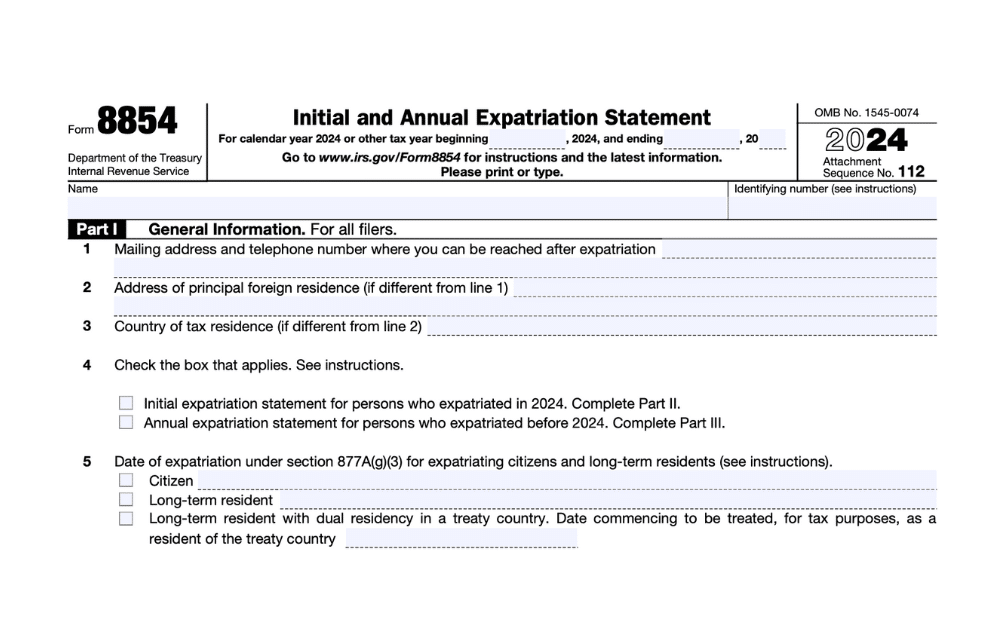Renouncing US Citizenship: Costs, Tax Implications & Requirements

- Who Qualifies as a Covered Expatriate?
- How Much Does It Cost to Renounce US Citizenship?
- Can I Change My Mind After Renouncing My Citizenship?
- What Are the Tax Implications of Renouncing Citizenship?
- What If I'm a Green Card Holder Considering Giving Up My Status?
- What Are My Alternatives to Renouncing?
- How Do I Renounce If I Decide It's Right for Me?
- Get Expert Guidance on Your Renunciation Decision
- Related Resources
According to the IRS, most Americans who renounce their citizenship don’t owe any exit tax because they don’t meet the “covered expatriate” thresholds. The State Department charges a flat $2,350 administrative fee for renunciation. Only those with a net worth exceeding $2 million, a high average tax liability, or incomplete tax compliance face additional exit taxes.
Renouncing US citizenship is one of the most significant and irreversible decisions you can make. Whether you’re an accidental American who recently discovered your citizenship obligations, an expat overwhelmed by complex filing requirements, or someone considering renunciation for personal reasons, you need clear information about what this decision actually costs and requires.
This guide explains exactly who pays exit taxes, how much you’ll owe, what makes someone a “covered expatriate,” and your alternatives to renunciation. We’ve helped over 23,000 expats file more than 71,000 returns, and we know that renunciation isn’t right for everyone. Sometimes, getting compliant and staying a citizen is simpler and less expensive than you think.
Who Qualifies as a Covered Expatriate?
The IRS considers you a covered expatriate if you meet ANY of the following three tests:
1. Net Worth Test
Your worldwide net worth exceeded $2 million on the date of your expatriation. This includes:
- Real estate (both US and foreign property)
- Investment accounts and securities
- Business interests and ownership stakes
- Retirement accounts (401(k), IRA, foreign pensions)
- Personal property (vehicles, jewelry, art, collectibles)
- Cryptocurrency and digital assets
Subtract your liabilities (mortgages, loans, debts) from your total assets to determine net worth.
2. Tax Liability Test
Your average annual net income tax liability for the five years before expatriation exceeds $206,000 (2025 threshold, adjusted annually for inflation).
This test examines the actual tax owed, not the gross income. If you paid high foreign taxes and used the Foreign Tax Credit to reduce your US tax liability to zero, you likely won’t meet this threshold.
3. Tax Compliance Test
You fail to certify on Form 8854 that you’ve filed all required US tax returns and paid all taxes owed for the five years before expatriation.
Critical point: This is the easiest test to fail and the most controllable. Many Americans considering renunciation discover they’re behind on filing simply because they were unaware of their obligations. One uncertified year automatically makes you a covered expatriate, even if your net worth is under $2 million and your tax liability is minimal.
The good news is that the IRS offers Streamlined Filing Compliance Procedures for Americans who unintentionally failed to file. This program allows you to catch up on the past three years of tax returns and six years of FBAR filings without penalties, enabling you to either renounce as a non-covered expatriate or become compliant and retain your citizenship.
Not sure whether you’re a covered expatriate? We can help you figure it out.
How Much Does It Cost to Renounce US Citizenship?
The current State Department fee for renouncing US citizenship is $2,350, which you pay at your renunciation appointment at a US embassy or consulate. This administrative fee covers the processing of your Certificate of Loss of Nationality.
Beyond this base fee, your total costs depend on whether you’re classified as a “covered expatriate”:
If you’re NOT a covered expatriate:
- State Department fee: $2,350
- Professional tax preparation for final returns: $500-$1,500
- Total: Approximately $2,850-$3,850
If you ARE a covered expatriate:
- State Department fee: $2,350
- Exit tax on unrealized gains above $890,000 (2025 exclusion)
- Professional tax and legal advice: $3,000-$10,000+
- Total: Varies significantly based on your asset values
Can I Change My Mind After Renouncing My Citizenship?
No. Renouncing U.S. citizenship is a permanent and irreversible act. Once you complete the renunciation process and receive your Certificate of Loss of Nationality, you cannot simply reclaim your citizenship.
The only exception is that Individuals who renounce before the age of 18 have a six-month window after turning 18 to reconsider their decision. For adults, the decision is final.
Regaining U.S. citizenship after renunciation requires completing the entire naturalization process as if you were a foreign national applying for citizenship for the first time. This process takes years, costs thousands of dollars, and carries no guarantee of approval. You’ll need to establish eligibility for a green card first, maintain permanent resident status for several years, and then apply for naturalization.
This permanence is why we strongly encourage Americans considering renunciation to explore their alternatives first. Many discover that while the US uses citizenship-based taxation requiring you to file returns regardless of where you live, most expats owe absolutely nothing in US taxes after applying the Foreign Earned Income Exclusion and Foreign Tax Credit.
What Are the Tax Implications of Renouncing Citizenship?
The tax consequences of renunciation depend entirely on whether you qualify as a “covered expatriate.” This determination affects not just your current tax bill, but potentially your ability to gift money to US persons and your ongoing US tax obligations.
If You’re NOT a Covered Expatriate
If you don’t meet any of the covered expatriate tests, renouncing citizenship is relatively straightforward from a tax perspective:
- You file your final US tax return for the year of renunciation
- You complete Form 8854 certifying five years of tax compliance
- You stop filing US tax returns in future years
- You have no exit tax liability
- You can give gifts to US persons without triggering special gift taxes
Most expats fall into this category, especially those who have maintained compliance with US tax obligations and don’t have substantial assets.
If You ARE a Covered Expatriate
Covered expatriates face more complex tax consequences:
Exit Tax on Unrealized Gains: The IRS treats all your worldwide property as if you sold it the day before expatriation. You pay capital gains tax on the appreciation above $890,000 (2025 exclusion amount), even though you haven’t actually sold anything.
Example: Maria owns stock currently worth $2 million that she purchased for $500,000. Her unrealized gain is $1.5 million. She can exclude $890,000, leaving $610,000 subject to capital gains tax. At a 20% rate, she owes approximately $122,000 in exit tax.
Continuing US Tax Obligations: Even after renouncing, covered expatriates may need to continue filing US tax returns if they:
- Own US retirement accounts like 401(k)s or IRAs
- Earn income from US sources (business interests, real estate, investments)
- Receive distributions from US pensions or deferred compensation
U.S.-sourced investment income faces a flat 30% withholding tax for former citizens.
Gift Tax Implications: If you’re a covered expatriate and give a gift exceeding $18,000 to a US person, that person pays gift tax at the highest gift tax rate (currently 40%). This tax applies to the recipient, not you, and can affect your relationships with US family members for years after renunciation.
What If I’m a Green Card Holder Considering Giving Up My Status?
Green card holders face the same exit tax rules as US citizens, but with a critical timing consideration: If you’ve held your green card in 8 of the past 15 years, surrendering it counts as expatriation and may trigger the exit tax.
Important timing rule: You’re considered to have “lived in” the US for an entire year if you were present even one day during that calendar year. For example, if you were in the US on December 31 of year one, lived continuously during years two through seven, and were present on January 1 of year eight, you’re deemed to have lived in the US for eight years.
Treaty Election Trap: Making a tax treaty election before meeting the “8 of 15 years” rule stops the clock, which sounds helpful. However, if you’ve already been a resident for 8 years, making a treaty election is itself an act of expatriation that could trigger the exit tax, even if you don’t surrender your green card.
Green card holders should consult with an expat tax specialist before making treaty elections or planning to surrender their status. The timing can make a substantial difference in your tax consequences. Learn more about the tax implications for green card holders.
What Are My Alternatives to Renouncing?
Before making the irreversible decision to renounce, consider these alternatives:
Get Compliant and Stay a Citizen
While you must file US tax returns, most expats owe $0 after applying available protections. The Foreign Earned Income Exclusion allows you to exclude up to $130,000 for the 2025 tax year, and the Foreign Tax Credit eliminates double taxation for expats in high-tax countries.
If you’re behind on filing, Streamlined Filing Procedures let you catch up on three years of returns and six years of FBARs without penalties if your failure to file was non-willful. Many Americans who thought renunciation was their only option discover that becoming compliant is simpler and less expensive.
Our flat-fee Streamlined Filing Package ($1,600) includes everything you need to get caught up penalty-free.
Consider the Annual Filing Cost vs. Renunciation
Professional expat tax preparation typically costs $530-$1,600 annually, depending on complexity. Compare this to the $2,350+ cost of renunciation plus potential exit taxes, and staying compliant often makes more financial sense, especially if you maintain any connections to the US.
Think About Your Long-Term Plans
Renunciation affects more than just taxes. You lose:
- The right to live and work in the US without immigration restrictions
- Consular protection when traveling
- The ability to pass US citizenship to future children born abroad
- Access to certain US government benefits and Social Security (depending on circumstances)
How Do I Renounce If I Decide It’s Right for Me?
If you’ve weighed the alternatives and determined renunciation is your best path, here’s the process:
Step 1: Get Tax Compliant
Before renouncing, ensure you’ve filed all required returns for the past five years. Use Streamlined Filing Procedures if you’re behind. You cannot certify compliance on Form 8854 without this foundation.
Step 2: Schedule Your Appointment
Contact a US embassy or consulate abroad to schedule your renunciation appointment. Availability varies by location, and some consulates have waiting lists of several months.
Step 3: Complete the Renunciation Process
At your appointment, you’ll:
- Meet with a consular officer
- Complete the required forms under oath
- Pay the $2,350 fee
- Surrender your US passport
Step 4: File Form 8854
You must file Form 8854 (Initial and Annual Expatriation Information Statement) with your final tax return. This form determines whether you’re a covered expatriate and calculates any exit tax owed.
Step 5: File Your Final US Tax Return
File Form 1040 for the year of renunciation, reporting all income through your expatriation date. If you’re a covered expatriate, complete Form 8854’s complex asset schedules, which show deemed sales.
Missing or incorrectly filing Form 8854 carries a $10,000 penalty, and failure to file can result in automatic covered expatriate status regardless of your actual net worth or tax liability.
Get Expert Guidance on Your Renunciation Decision
Renouncing US citizenship is permanent, and the tax implications can be substantial if you’re classified as a covered expatriate. Before making this irreversible decision, you need to understand all your options and their long-term consequences.
Many Americans considering renunciation discover they can achieve their goals through compliance strategies that cost far less and preserve their citizenship rights. Whether you’re an accidental American who recently discovered your filing obligations, a long-time expat overwhelmed by compliance requirements, or someone with genuine reasons to renounce, you deserve clear guidance based on your specific situation.
Considering renunciation or need to get compliant first? Contact us, and one of our Customer Champions will help you understand your options. If you’re ready to be matched with a Greenback accountant, click the get started button below.
Ready to make an informed decision about renunciation?
This article provides general information and should not be considered specific tax or legal advice. Renunciation and exit tax rules are complex and subject to change. Always consult with qualified tax and legal professionals regarding your specific situation before making any decisions about renouncing US citizenship.
Related Resources
Renunciation & Exit Tax
Alternatives to Renunciation: Getting Compliant
- Streamlined Filing Procedures: Catch Up on Taxes Penalty-Free
- Form 14653: Certification for Streamlined Filing
- Delinquent FBAR Submission: How to Get Back on Track
Understanding US Expat Tax Obligations
- Why Do I Have to Pay US Taxes If I Live Abroad?
- Citizenship-Based vs. Residency-Based Taxation
- US Expat Taxes: Complete Guide
- What Are Expat Tax Services?
Key Tax Benefits & Credits
- Foreign Earned Income Exclusion (FEIE): How to Claim
- Form 2555: Filing for the FEIE
- FEIE vs FTC: Which Strategy Saves More Money?
- Foreign Tax Credit: Complete Guide
- Double Taxation: What It Is and How to Avoid It
- Bona Fide Residence vs. Physical Presence Test


